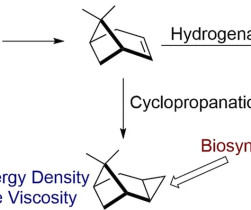US Navy researchers demonstrate synthesis of high-density biofuels from myrtenal using cyclopropanation
Green Car Congress
JULY 31, 2023
Recent work has shown that chemoselective hydrogenation of ring-strained monoterpenes is an effective strategy for the generation of high-performance fuels. Alternatively, the alkenes can be easily converted to cyclopropane rings, which further enhances the density and volumetric heat of combustion (NHOC) of these hydrocarbons.






















Let's personalize your content